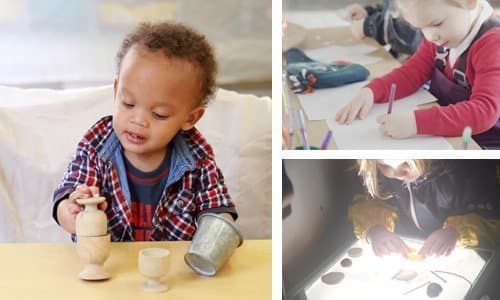Pulling it all together
Young children need to build up their confidence with large and fine physical skills and movements. When children are genuinely ready to learn how to write, then they will need the focussed physical skills that enable them to hold and control a fine tool like a pencil and to lift it off and onto the page. However, those fine physical skills are supported with happy practice within a wide range of freely chosen play activities. Fine physical skills depend upon young children’s confidence in their own bodies and their ability to make large, as well as small scale, physical movements, to fine-tune their vision and co-ordination.
Young children with an enthusiasm for books also learn a very great deal about the art of story telling. Good early years practice is to keep the groups small and to be responsive to young children’s requests for a story.
Similarly when young children have had plenty of experience of songs and rhymes, they start to make up their own. It is very endearing to listen and watch as young children make up their own songs and tuneful ditties. It is also worth standing back and admiring how much they have learned in order to create in this way.
Becoming bilingual
Many young children across the UK are tackling more than one language within their early childhood. Young children’s brains are programmed ideally for learning language. Being bilingual or multilingual only seems to be unusual, or an inevitable problem, to adults who grew up monolingual. However, children are very busy learning vocabulary from more than one language. Some will soon become aware that their family language is written in a completely different way from English. Early years practitioners need to be fully aware of the learning task for these children, who are or are becoming bilingual.
Of course, if you do not speak a child’s home language, then you cannot make an informed judgement whether she or he is speaking and listening up to their age. You certainly must not judge their language ability exclusively by English, especially if children have not long started to take this language on board. It will be important to get a reliable idea of a child’s ability in their home language. If parents are bilingual, then you will be able to have a conversation with them. If not, there will be very good reason to find a bilingual practitioner, even if not from your own setting, who can give you a more accurate view. That practitioner should also explain to the child’s parents why you have asked for some help in this way.
Early literacy is supported whenever children are keen to weave stories: talking out loud, creating plots and characters. When young children’s mark making moves towards letter-like shapes, stories are sometimes what they most want to ‘write’. Children who have created lots of narratives through play are adept at planning their stories when they get to start writing properly.



